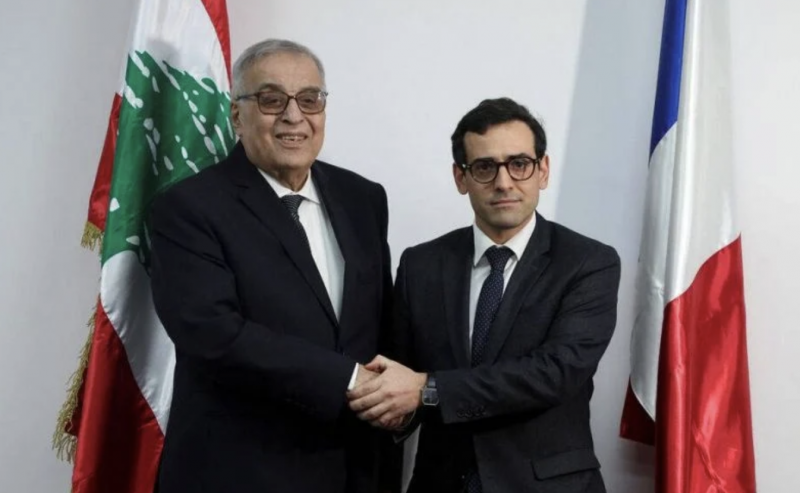
Lebanese Foreign Minister Abdallah Bou Habib with his French counterpart Stéphane Séjourné, in Beirut, Feb. 6. (Credit: Mohammad Azakir/Reuters)
Bou Habib came under fire on Tuesday following an interview with the Nida al-Watan daily, in which he reportedly stated that Lebanon “refuses Hezbollah’s withdrawal to the north of the Litani,” to calm tensions with Israel.
However, this provision is a pillar of UN Security Council Resolution 1701, which Beirut (and Hezbollah) endorsed in 2006.
These remarks earned him a great deal of criticism, particularly from the opposition camp. “He is the spokesman for the militia [Hezbollah],” wrote MP Nadim Gemayel (Kataeb\Beirut I) on X.
The Lebanese Forces denounced in a press release “the ambiguous positions of Lebanese diplomacy.”
“I never said that and I never will. My remarks were misrepresented and taken out of context,” Bou Habib told L’Orient-Le Jour.
In his interview with Nida al-Watan, he also said that the Lebanese Army cannot ensure stability in south Lebanon as provided for in Resolution 1701.
Bou Habib denied these remarks in a statement on Tuesday. “I have always said that Lebanon is in favor of the implementation of Security Council Resolution 1701 in its entirety, on both sides,” he told L’Orient-Le Jour.
Does this also apply to the provision on Hezbollah’s withdrawal? “[To] the entire text,” he reiterated. “But it’s not up to us to speak for Israel.” “That’s what I told the French Foreign Minister [who was in Beirut on Tuesday]. We don’t want war, we want a comprehensive and lasting solution in South Lebanon. We want peace; that’s Lebanon’s position,” he added.
What about Hezbollah, which is the cabinet’s main supporter and describes Israel as an absolute evil? “I don’t know,” he replied, “I’m not their spokesman.”
Protocol or political approach?
The minister’s remarks have not convinced everyone. “Let’s not fool ourselves. Abdallah Bou Habib is a smart diplomat with a great deal of experience,” said Makram Rabah, analyst and professor of history at the American University of Beirut. “His remarks are meticulously calculated. They are not clumsy mistakes, but a reflection of what this minister thinks.”
Appointed to the Bustros Palace by former President Michel Aoun, Bou Habib is close to the Free Patriotic Movement (FPM) and its leader, Gebran Bassil. “He belongs to the same camp as Hezbollah and confuses his party’s interests with those of the nation,” said Rabah.
Rabah also believes that Bou Habib summoning the British ambassador to Beirut on Tuesday is “clearly a political message.”
Officially, this move is a protest against the fact that UK Foreign Secretary David Cameron allegedly did not ask to meet his Lebanese counterpart — whose brother had just passed away — during his visit to Beirut last week, as is the protocol.
However, many analysts believe that this is a negative signal sent by Hezbollah to London, which is pressing for the construction of surveillance towers on the Lebanese-Israeli border to ensure the implementation of Resolution 1701 on both sides.
“The British have a lot of experience in this area, given the war in Ireland,” said Rabah. “They have already set up similar towers on the Lebanese-Syrian border, which have produced excellent results in the fight against the Islamic State organization.”
Speaking on condition of anonymity, a senior diplomat said, “The British violated diplomatic protocol by avoiding the minister of foreign affairs. They could have arranged a brief meeting between Cameron and Bou Habib for form. It’s a good thing their ambassador was summoned.”
Another misunderstanding is related to the statement that Bou Habib made following his meeting with his French counterpart on Tuesday. He claimed that France “passed on Israeli warnings to the Lebanese.”
These remarks, which were even broadcast to international agencies, came as a surprise to the French embassy. “Mr. Bou Habib gave the impression that Stéphane Séjourné was there to pass on Israeli threats to Lebanon. This is not true. We are here to find a diplomatic solution that involves concessions on both sides,” said a French diplomatic source.
“Mr. Séjourné stressed the urgency of the situation, but that does not mean that he passed on threats to me or that he said war was imminent,” Bou Habib added to L’Orient-Le Jour.
“Sometimes you get the impression that he keeps both parties sweet,” said a Beirut-based diplomat, referring to the international community and Hezbollah.
Baabda? ‘Never in a million years’
Indeed, when he was appointed, Bou Habib — who was ambassador to Washington — was perceived as able to act as a link between the camp in power and the Americans. Since then, he has tried to maintain this delicate balance but did not always succeed.
For instance, he caused controversy with Hezbollah in 2021, when Lebanon condemned the Russian invasion of Ukraine, and more recently in October 2023, when he did not protest against the League of Arab State’s decision to criticize Hamas’ Oct.7 attack. However, it is difficult to maintain this in-between position when the issue directly concerns Lebanon.
“Bou Habib’s position is often reviewed and adapted according to the person he is talking to or the message he wants to get across,” said the above-mentioned Lebanese diplomat. “Perhaps because, as a good Maronite minister, he hopes to become president.”
The presidential seat has been vacant since October 2022, pending a consensus figure both in Lebanon and abroad. While he manages to win over Hezbollah and the international community, could Bou Habib be the long-awaited candidate for Baabda? “Me? Never in a million years,” he said.
“My positions have always been clear and constant, and I have nothing to do with the presidency. To tell you the truth, I can’t wait for a president to be elected and for a new cabinet to take over. I want to go home.”
This article was originally published in L'Orient-Le Jour. Translated by Joelle El Khoury.